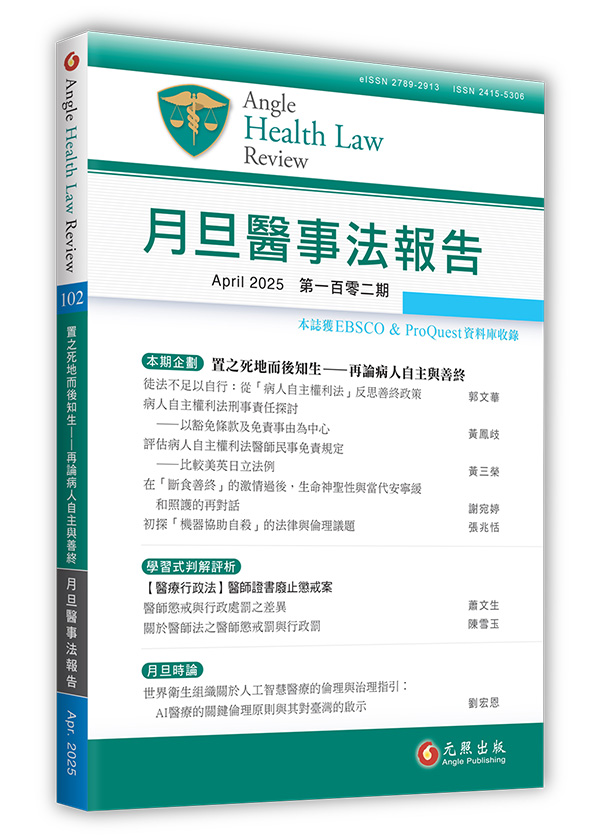評估病人自主權利法醫師免責規定——比較美英日立法例【本期企劃】 試閱
A Critical Analysis of the Safe Harbor Provision in the Taiwan Patient Right to Autonomy Act Granting Immunity to Physicians from Civil Liability with Comparison to US, UK, and Japanese Legislation
病人自主權利法第14條第5項後段明文醫師執行病人所簽署,載明終止、撤除或不施行維持生命治療(life sustaining treatment, LST)全部或一部內容之預立醫療決定的民事免責規定。從美英日立法例之比較而言,醫師執行病人載明拒絕LST(含ANH)之預為決定(advance decision, AD),而得主張民事免責情形,不應僅限於前揭病主法規定之狀況。原則上,只要本人就完成表明拒絕LST之AD,確未欠缺意思能力,而該AD有效及得適用於當前狀況,醫師並依循該AD,而執行拒絕LST者,當即有基於因係依循本人AD之行為,得主張民事免責之餘地。
PRAC §14(5)(b) expressly provides a safe harbor for physicians to carry out signed patient advance medical decisions (AMD) that authorize physicians to terminate, withdraw, or withhold life sustaining treatment (LST). Collectively, the AMD are called ‘refusal’ of LST. A refusal may apply to LST in whole in or party. In Taiwan, the safe harbor under PRAC §14(5)(b) generally shields the physician from civil liability when she carries out AMD of LST.
A comparison of related legislation in the United States, the United Kingdom, and Japan shows that the physician safe harbor in Taiwan should be expanded. In other words, Taiwanese physicians should be able to claim immunity from civil liability when carrying out AD by patients to refuse LST (including ANH) in a broader set of situations going beyond the relatively narrow types of conduct that currently enjoy immunity under PRAC §14(5)(b).
In principle, a physician should be permitted to assert a civil liability immunity defense so long as [i] a patient who does not lack capacity has completed an AD refusing LST [ii] the AD is effective and applies to the clinical situation, and [iii], the physician carries out the AD to refuse LST. The civil liability immunity defense is available because the physician carried out the AD in compliance with the patient’s advance decision.
029-045






